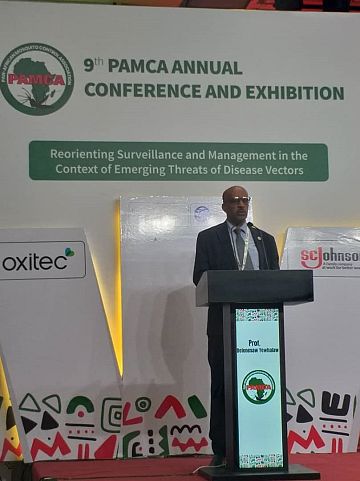African-led vector control solutions in the context of emerging threats
18 September 2023
The Pan-African Mosquito Control Association (PAMCA) opens its ninth annual conference this week, held this year in Addis Ababa, Ethiopia. The event, attended by scientists, public health professionals and specialists in vector-borne diseases, is a vital catalyst for research, collaboration, and innovation in mosquito control and elimination strategies on the continent and worldwide.
Africa is the most heavily impacted continent afflicted by vector-borne diseases. It accounts for approximately 95 percent of the global burden of malaria, around 241 million cases, and is significantly impacted by other debilitating vector-borne diseases including dengue, Zika and yellow fever. PAMCA, alongside the national steering committee and conference co-host, the Ethiopian Public Health Association (EPHA), are committed to working towards a common vision of an Africa free from vector-borne diseases, especially malaria and neglected tropical diseases (NTDs).
Reorienting surveillance and management in the context of emerging threats of disease vectors is the primary theme of this year’s conference, a timely focus in light of research published last week in Nature Microbiology showing new strains of malaria-causing parasites in Ethiopia that are both resistant to current treatments and escape detection by common diagnostic tests. This type of ‘double-resistant’ malaria strain could increase cases and deaths from malaria and make elimination an even greater challenge.
Dr Agonafer Tekalegne, Malaria Consortium’s Ethiopia Country Director, commented on the event: “As a member of this year’s PAMCA organising committee, it is gratifying to see leading experts in mosquito-borne disease control coming together in my home country, especially at a time when we are seeing increasing disruptions to vector control efforts with mosquitoes adapting at pace to existing preventative interventions and treatments in tandem with external factors like climatic and ecological changes. We need to embrace opportunities like this to champion African-led and African-focused research and approaches that recognise the nuances of the region’s diverse ecosystems, climate and health systems. Spotlighting African scientists and policymakers is pivotal in driving sustainable progress against these pernicious diseases and ensuring that we have the evidence to inform the most effective control strategies.”
The emergence and spread of invasive malaria and arboviral disease vectors in Africa and elsewhere outside of their native territories is of particular concern, highlighting the need for accurate surveillance systems that can be connected across countries. Reported increases in Anopheles stephensi – the ‘urban malaria vector’ – is also cause for concern with continued urbanisation likely to increase disease transmission. Representatives from Ethiopia and Sudan will be discussing their country’s respective approaches to control this emergent vector and technical updates will be shared about the preparedness, gaps, and response to An. stephensi in Africa.
Genetic modification as a tool to add to malaria control and elimination efforts is also a topic of much debate and features across the programme with results being shared from field trials of malaria vectors engineered with gene drive technology. Adaptations to more traditional interventions such as insecticidal net (ITN) products, as experts seek to improve vector control decisions and better understand the cost-effectiveness of new, more efficacious ITNs.
Header image: Professor Delinesaw, Head of PAMCA Ethiopia office
Related content
16 January 2023
Critical conversations on genetic control strategies for malaria control in East Africa
19 August 2022The spectre of rising mosquito-borne urban disease
Latest news
- Malaria Consortium honoured by Ugandan government for contribution to combat malaria23rd April 2024
- International summit calls for AMR accountability in public health interventions21st March 2024
- Global SMC community celebrates new milestone at SMC Alliance Annual Meeting in Nigeria6th March 2024
- Scaling up key interventions could halve pneumonia-related childhood mortality13th February 2024
- Malaria Consortium and eGov Foundation join Mozambique’s national malaria programme to digitalise seasonal malaria chemoprevention campaigns8th February 2024
- World’s first malaria vaccine rollout launched in Cameroon22nd January 2024